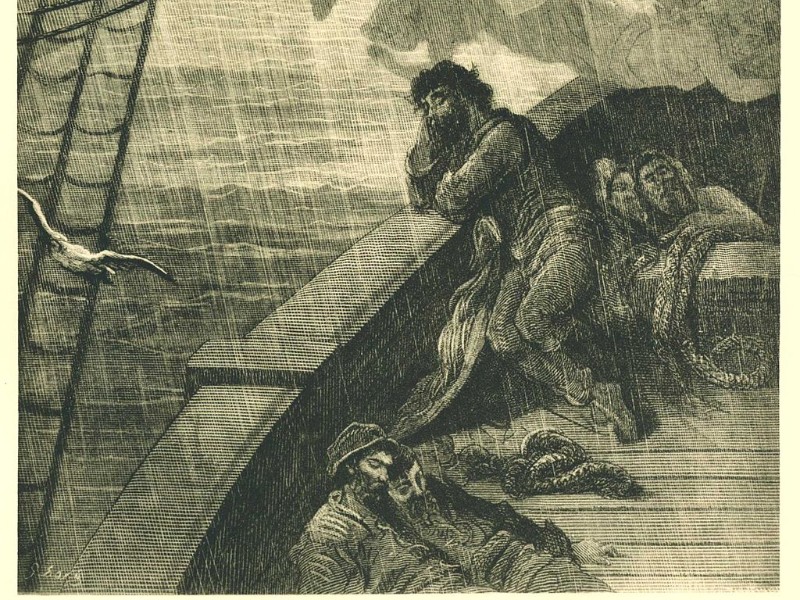In 2009, I was asked to address a small workshop at TanenbaumCHAT on Yom ha-Shoah. In the weeks leading up to it, though I couldn’t really articulate my reasoning, my mind had been turning to a poem that I had first encountered in high school: Samuel Taylor Coleridge’s “The Rime of the Ancient Mariner.” Why would that poem, perhaps written under the influence of opium but certainly featuring Christian theological overtones, have insinuated itself so profoundly on me leading up to that day?
To try to explain why it might be relevant, I started by reading a few verses.
“It is an ancient Mariner,
And he stoppeth one of three.
‘By thy long grey beard and glittering eye,
Now wherefore stopp’st thou me?”
An ancient mariner, an old sailor, buttonholes a man who is on his way to a wedding. The man is late for the occasion, and certainly doesn’t have time to listen to the talk of an old, deranged, man.
“The Bridegroom’s doors are opened wide,
And I am next of kin;
The guests are met, the feast is set:
May’st hear the merry din.’
He holds him with his skinny hand,
‘There was a ship’ quoth he.
‘Hold off! unhand me, grey-beard loon!’
Eftsoons his hand dropt he.”
But the Mariner persists, with a story that starts off innocently enough as he and 200 other sailors set sail.
“The wedding guest he beat his breast,
Yet he cannot choose but hear;
And thus spake on that ancient man,
The bright eyed Mariner.”
The ship goes off course into southern Antarctic waters. It encounters an albatross, a large bird, that leads it back out. But then the Mariner shoots and kills the albatross with a bow and arrow. The weather changes, the ship goes off course again, and things turn dreadful.
“Water, water everywhere,
And all the boards did shrink;
Water, water everywhere,
Nor any drop to drink.”
One by one the sailors die.
“Four times fifty living men,
(And I heard not sigh nor groan)
With heavy thump, a lifeless lump,
They dropped down one by one.”
Only the mariner lives on.
“The many men, so beautiful!
And they all dead did lie;
And a thousand thousand slimy things;
Lived on; And so did I.”
* * *
How many times have I heard, “My entire family perished in the Shoah. Why did I survive?” My mother used to ask why she survived. And though she, her three children, and her six siblings miraculously were spared, her husband – my father – and his entire family were taken to Auschwitz and perished. As did her father, who was forced to dig his own grave together with all the other Jews of Brzozow.
I have often asked myself this unanswerable question, though as a hidden infant, I could not bear direct witness to the unbearable suffering and horrors that engulfed millions of others. And yet it has haunted me ever since I can remember.
When I was in college, a close friend of mine once told me to bury the dead, which one must surely do if one can. Physically, most of them were not buried, and they keep turning up for me at unexpected times and places. I imagine in my mind’s eye that the dead would surely admonish us if we only focused backwards – if we were paralyzed by introspection. By the same token, I can’t imagine that they would be comforted by our just trotting them out once a year.
A partial answer to my mother’s question came to me slowly as I prepared to speak at a breakfast in 2011 upon my retirement as a teacher after 31 years.
I hear a cacophony of voices from the distant and recent past, all clamouring to be heard – the voices of rabbis and heretics, of the pious and the impious, of Zionists and Bundists and skeptics, of young and old.
They all want to have a legacy. And it is in the give and take of Jewish children arguing about a difficult talmudic passage, in students cutting their teeth, so to speak, as they attempt to express themselves in Hebrew. It is about engaging with our forefathers and mothers and prophets and kings and heroes and heroines and scoundrels in Tanakh, as well as in tracing our heritage from ancient caravan routes to the present day. From the Exodus from Egypt to the building of the Temples, to their destruction, to exile to mass migration… and the list goes on and on.
Without a strong sense of our past – not a superficial one – we are lost. We have no future. I have no future.
Each Jewish child represents multiple voices from the past, and in each of them is the seed of our future, of the future of my father, and so many others whose bones were burnt in Auschwitz and other horrendous places.
Please be true to these voices from the past. They represent our eternal spark.
I’m not an ancient Mariner,
Though ancient I might be.
And by my short grey beard,
I don’t stop one of three…
And yet my tale keeps haunting
So difficult to tell, and daunting.
It must be told as I get old
For a future that’s not wanting.







